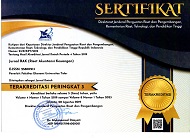FEE BASED INCOME IN MODERATING THE EFFECT OF RESTRUCTURING CREDIT, CREDIT, AND DEPOSITS ON PROFIT PERFORMANCE OF CONVENTIONAL COMMERCIAL BANKS
DOI:
https://doi.org/10.31002/rak.v7i2.431Keywords:
Credit Restructuring, Credit, Savings, FBI (Fee Based Income), Company Size, Profit PerformanceAbstract
This study aims to analyze the effect of credit restructuring, credit, and savings on earnings performance and analyze the FBI (Fee Based Income) in moderating the effect of credit restructuring on earnings, credit on earnings, and savings on earnings controlled using firm size (Size). The population in this study is conventional commercial banks listed on the Indonesia Stock Exchange (IDX) for the 2019-2020 period, the number of samples is 43 commercial banks, namely all conventional commercial banks listed on the IDX. This study uses secondary data in the form of financial statements published by commercial banks listed on the Indonesia Stock Exchange (IDX) for the 2019-2020 period. The data analysis used in this research is multiple linear regression analysis and moderation regression analysis with the Moderated Regression Analysis (MRA) interaction test. The results of multiple linear regression analysis show that credit restructuring has a negative effect on profits, credit has a positive effect on profits, and deposits have a positive effect on profits. The results of the moderating regression analysis with the Moderated Regression Analysis (MRA) interaction test show that the FBI weakens the effect of credit restructuring on earnings, the FBI strengthens the effect of credit on earnings, and the FBI strengthens the effect of savings on earnings.

















